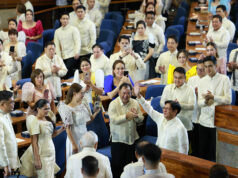Palace cool on additional powers for PACC
MALACAÑANG has thumbed down the idea of granting the Presidential Anti-Corruption Commission (PACC) “prosecutorial powers.”
“Hindi, dahil ang batas ay ibinigay na sa Ombudsman. Magiging duplicate na ‘yun,” Presidential Spokesperson Salvador S. Panelo said in an interview on Feb. 21. (No, because that [authority] is given to the Ombudsman. [To otherwise delegate that elsewhere would be a duplication]).
“Hindi pwede. Sa mga public officials. Ang Ombudsman lang…tsaka DoJ.” (Only the Ombudsman and the DoJ [Department of Justice]).
PACC Chairman Dante L. Jimenez, in a phone interview last December, said he wanted to ask President Rodrigo R. Duterte to grant the agency prosecutorial powers and expand its jurisdiction.
“Yes, katulad sa (like the) Independent Commission Against Corruption (ICAC) of Hong Kong, they can investigate, they can prosecute and at the same time [have a program on] prevention and education,” Mr. Jimenez said.
The expansion of jurisdiction that the PACC seeks to recommend includes handling cases of government workers below the salary grade 26 level.
Mr. Duterte created the PACC in 2017 by signing Executive Order No. 43. The commission operates under the Office of the President and is primarily made up of a chairperson and four commissioners. The commission was formed in the wake of Mr. Duterte’s criticisms against then Ombudsman Conchita Carpio-Morales.
Malacañang announced on Jan. 11 that Mr. Duterte had issued another executive order mandating the PACC to recommend complaints of violations of the Anti-Red Tape Act to the Anti-Red Tape Authority (ARTA).
Executive Order No. 73, which the President signed on Dec. 28, states that the PACC shall “(r)ecommend to the Anti-Red Tape Authority, for investigation, violations of Republic Act No. 9485, otherwise known as the Anti-Red Tape Act of 2007, as amended, and its Implementing Rules and Regulations.”
The President’s order also states that “nothing shall prevent the President, in the interest of the service, from directly investigating and/or hearing an administrative case against any presidential appointee or authorizing other offices under the Office of the President to do the same, as well as from assuming jurisdiction at any stage of the proceedings over cases being investigated by the commission.” — Arjay L. Balinbin



